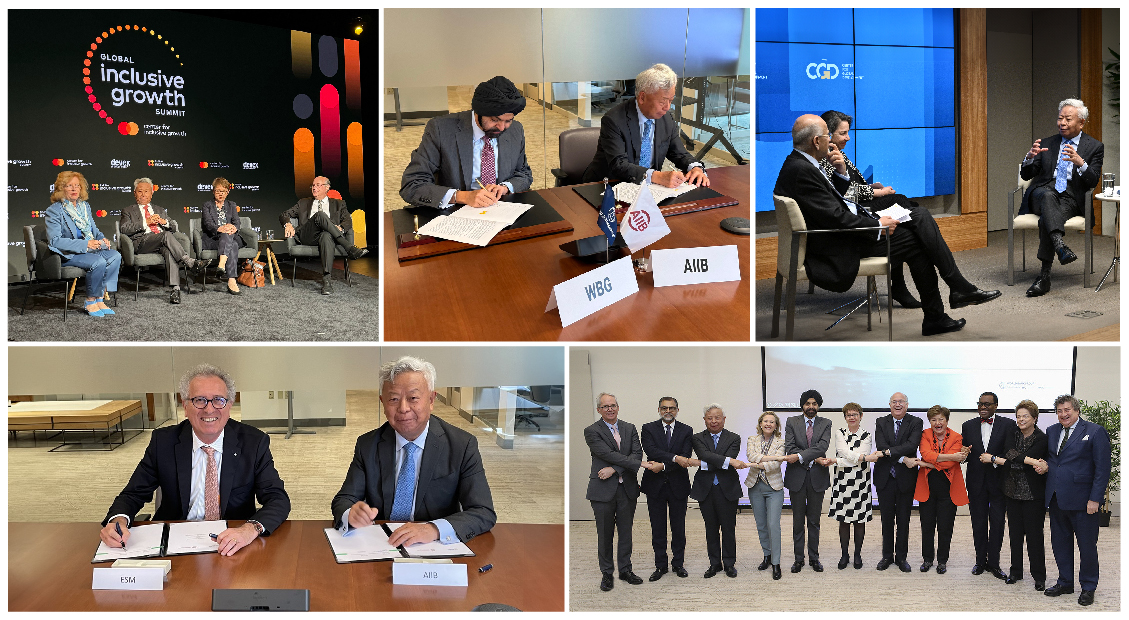A delegation from the Bank led by President Jin Liqun concluded a successful mission to the 2024 Spring Meetings of the World Bank Group and International Monetary Fund (IMF) in Washington D.C. April 16-20. The week was marked by significant milestones in the collective efforts of AIIB and other multilateral development banks (MDBs) to address global challenges and provide a more systemic response to the needs of their clients. As one of the newest MDBs, it was an opportunity for AIIB to showcase our innovative governance model, strong focus on climate, and commitment to the highest standards for building sustainable, digital and social infrastructure for tomorrow.
Highlights
- Strengthened ties and partnership with the World Bank Group. AIIB President Jin and World Bank Group President Ajay Banga renewed a memorandum of understanding between the two institutions to enhance co-financing in critical areas related to the Sustainable Development Goals (SDGs), including climate, biodiversity and health. The MOU reaffirms strong ties already forged through a series of innovative and impactful initiatives to benefit those most in need.
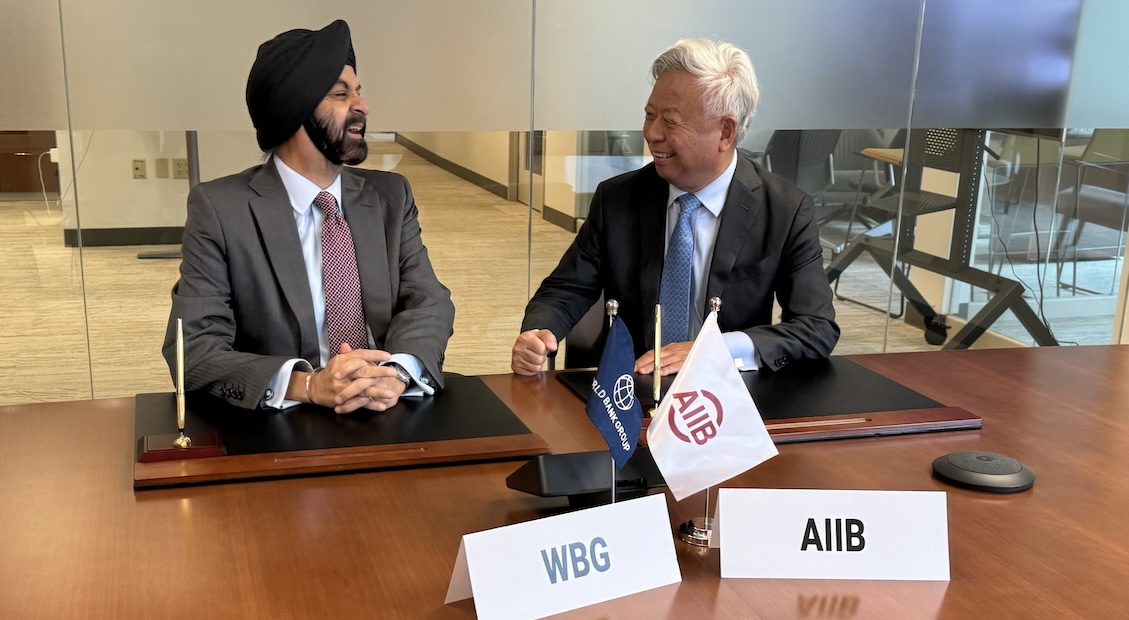
World Bank Group President Ajay Banga and AIIB President Jin Liqun
- Continued to advocate for MDBs to work better as a system and lower transaction costs for clients. President Jin emphasized the importance of MDB collaboration and the promotion of mutual recognition and harmonization of policies across several events, including meetings with MDBs and G20.
According to President Jin: “AIIB’s experience of applying a single-policy framework and relying on the assessments conducted by the lead co-financier has demonstrated that MDBs can work more effectively and efficiently when we mutually recognize our policies and standards. This significantly reduces the burden of multiple policy requirements on our clients, many of whom have low project preparation and implementation capacity. Through our co-financing with other MDBs such as the World Bank, we have shown that it is possible to increase our development impact without increasing the operational complexities of a project.”
He added: “I believe that MDBs should work as a system, closely collaborate at all levels, and promote mutual recognition and harmonization of our policies. There is already a lot of alignment in our social, environmental and procurement standards, as well as how our integrity and independent accountability functions operate. It is time that we actively work together to simplify processes and, where possible, harmonize our policies.” - Committed to joint and coordinated action alongside MDB heads. At the first ever retreat, in line with the collaboration agenda agreed in Marrakesh in October 2023, the heads of 10 major MDBs agreed on a joint action-plan and timeline for delivering across five critical areas: scaling up MDB financing capacity, boosting joint action on climate, strengthening country-level collaboration and co-financing, catalyzing private-sector mobilization, and enhancing development effectiveness and impact. These deliverables are contained in a Joint MDB Viewpoint Note published as the main outcome of the retreat.
President Jin noted the excellent collaboration on the Viewpoint Note: “The note aptly captures the significant progress we have achieved since MDBs committed to working together at Marrakesh in 2023 and the high level of ambition we hold looking forward. It also marks a significant milestone in our collective efforts to address global challenges and respond to the demand for more MDB action.”
President Jin identified a few additional flagship initiatives, including simplifying processes and, where possible, harmonizing MDB policies beyond mutual reliance on procurement standards to better deliver for clients; continuing efforts and collaboration on innovative financing structures; and developing pooled project preparation structures that can generate more investable pipeline and incentivize co-financing in a more systematic manner.
- Launched a groundbreaking MDB collaborative co-financing platform. AIIB, together with other MDBs, launched a joint digital portal to curate and list projects seeking co-financing from across the portfolios of these institutions, and provide a forum to discuss common co-financing issues. The first of its kind, the portal seeks to facilitate greater transparency and efficiency. It should benefit from a shift from manual to digital tools to bolster partner coordination. At the same time, it should minimize aid fragmentation and support efforts to harmonize policies to reduce administrative burdens and lower transaction costs for clients. The portal covers projects seeking co-financing from MDBs at any stage of development, from preparation to downstream finance, with more than 70 projects amounting to over US65 billion.
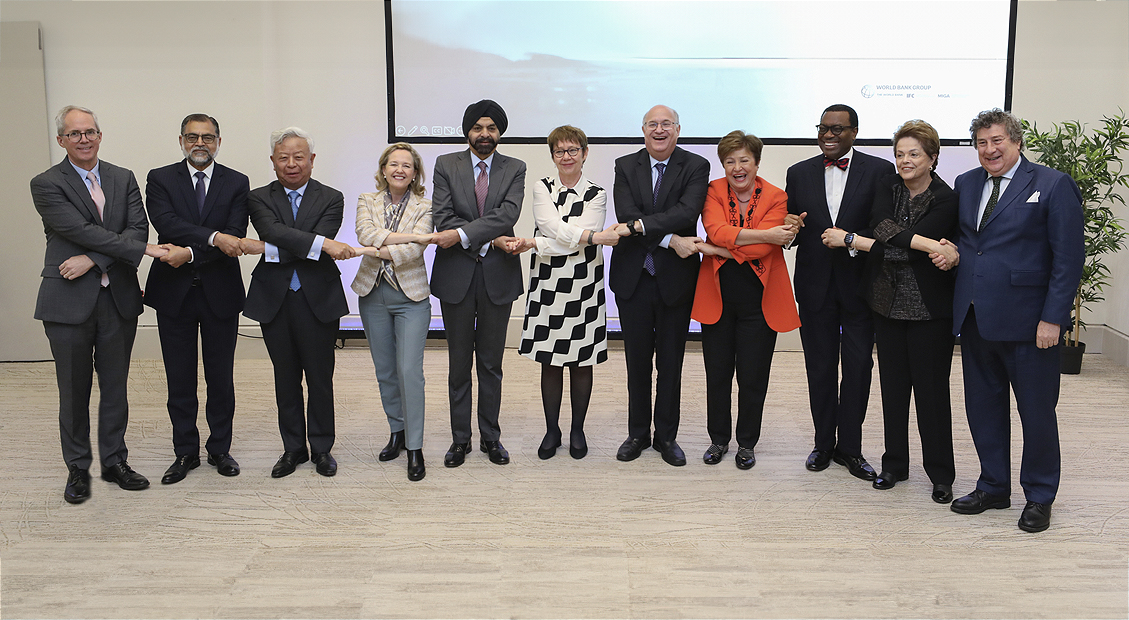
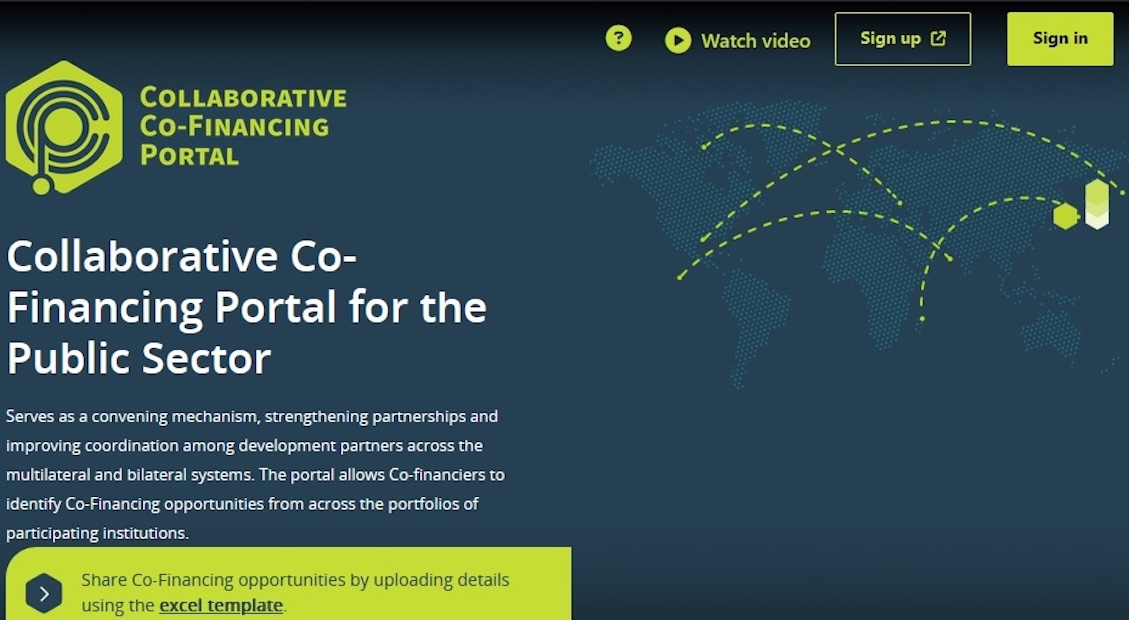
- Participated at the G20 finance ministers and central bank governors sessions. President Jin participated in G20 Finance Ministers and Central Bank Governors (FMCBG) sessions organized by the Brazilian Presidency. Speaking on the need for better, bigger, more effective MDBs, President Jin expressed support for the proposed G20 MDB Roadmap laid out by the Brazilian G20 Presidency: “Working closely with our peers, we are committed to contributing to the ambitious goals of enhancing the effectiveness, scale and efficiency of MDBs, which are in line with the priorities established by the Heads of MDBs in Marrakesh in October 2023. As the newest member of the MDB family, AIIB has had the opportunity to learn valuable lessons from others and apply innovative approaches to enhance operational efficiency and reduce transaction costs for our clients. AIIB is eager to contribute our experience and track record to important aspects of the G20 MDB Roadmap, such as harmonizing standards and exploring innovative approaches to mobilize private-sector participation, including the local-currency vehicle proposal that we are working on together with EBRD.”
- Sir Danny Alexander, Vice President for Strategy and Policy, also represented AIIB at the G20 Finance Ministers session on climate. He expressed AIIB’s support for the Brazilian G20 Presidency call for just and equitable transitions and discussed AIIB’s own Climate Action Plan.
- Engaged with heads of MDBs with co-Chairs of the 2023 G20 Independent Experts Group on MDB Reform. President Jin, along with other MDB representatives, met with N.K. Singh and Larry Summers, co-chairs of the 2023 G20 Independent Expert Group on MDB Reform, to discuss MDB reforms and exchange views and updates on the progress made and challenges faced by MDBs.
- Held a CSO Roundtable on the Corporate Strategy Mid-Term Review. In a meeting with civil society organizations (CSO) representatives as part of AIIB’s Corporate Strategy Mid-term Review, President Jin reiterated AIIB’s commitment to meaningfully engage with CSOs on the Bank’s policies and operations, particularly in the areas of climate change, energy, gender, the Project-affected People’s Mechanism and the Bank’s approach to CSO engagement. This is the second bilateral meeting between AIIB and CSOs held at the World Bank Spring Meetings, with the first held in 2023. The roundtable participants highlighted the Bank’s strengths, including clear governance, a coherent strategy, operational flexibility and responsiveness, and a partnership model, and the value of broader consensus on the strategic directions of the AIIB’s Corporate Strategy.
- Signed an MOU with the European Stability Mechanism. President Jin and European Stability Mechanism Managing Director Pierre Gramegna renewed the 2019 MOU between the two institutions to enhance partnerships and build on our successful collaboration. The partnership aims to promote sustainable development by leveraging the strengths and expertise of both sides. The renewed MOU outlines a framework for cooperation, including mutual technical assistance in areas such as business planning, policy analysis and treasury activities. The strengthened partnership highlights the importance of international collaboration in addressing global challenges and advancing economic growth.
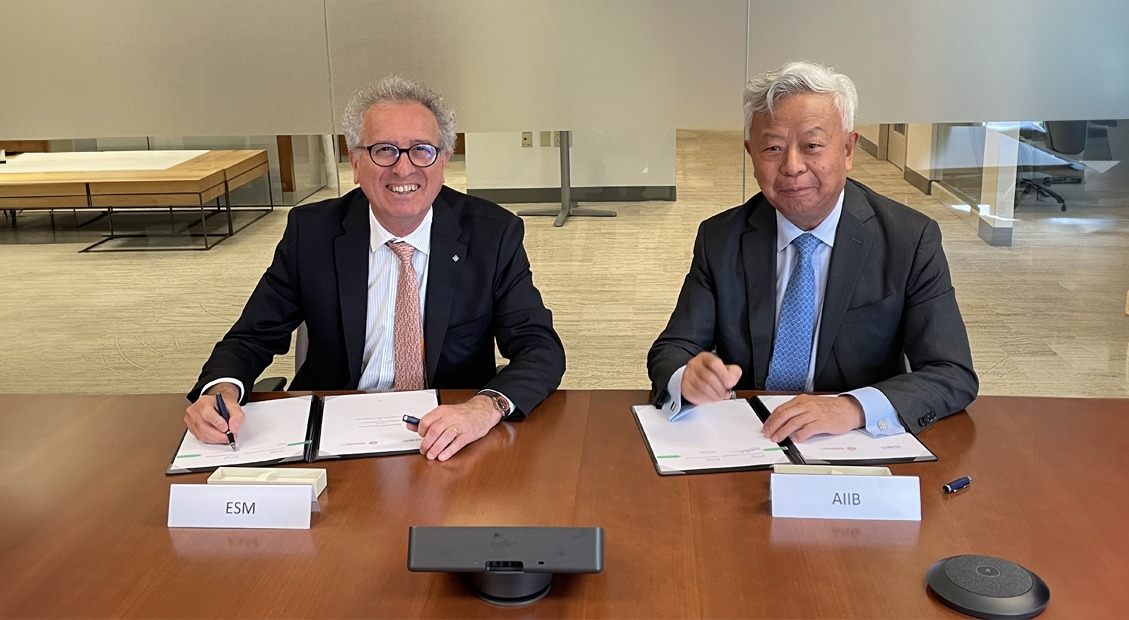
- Addressed a broad set of audiences, President Jin sat with several think tanks to discuss topics such as AIIB’s collaboration with other MDBs, its efforts to address the climate crisis, the need to mobilize private-sector investment to cover the infrastructure gap, ongoing MDB reform and the joint progress made, and new ideas for moving forward.
- Listen to his interview by Amin Mohseni, Director of Bretton Woods 2.0 Project and MDB research, for think tank Atlantic Council at https://www.youtube.com/watch?v=Q1Au1kfEfdA
- Listen to his Fireside Chat with the Center for Global Development (CGD), moderated by CGD President Masood Ahmed, at https://www.youtube.com/watch?v=_g35dSyNmoQ
- Listen to the Devex-Mastercard Global Inclusive Growth Summit Panel Discussion on MDB Collaboration moderated by Merit Janow, Chair of the Board of Mastercard at https://www.youtube.com/watch?v=ms6P3rUaBWg.
- In a Fireside Chat with Asia Society’s President and Chief Executive Officer, Dr. Kyung-wha Kang, on AIIB’s evolution, current operations and path forward, President Jin emphasized the importance of MDB cooperation: “When MDBs work together to make it easier for clients to work across multiple institutions, we unlock additional capacity on their side to focus on citizens’ development rather than competing duplicative administration and assessment.” He added: “When it comes to the multilateral system, togetherness is our superpower. At a time when global geopolitical tensions and political fragmentation are on the rise, MDBs are working together as an enduring counterbalance for continued cooperation toward a better tomorrow.”
- President Jin delivered a public lecture at the American University together with Professor Piper Campbell, School of International Studies Chair and former US Ambassador to Mongolia, and Professor Amitav Acharya, Distinguished Professor of International Relations. Speaking before students of international development and foreign affairs, President Jin shared how AIIB’s structure gives developing members a larger voice within a framework that incentivizes consensus building: “As of today, we have approved more than USD51 billion in infrastructure financing across 37 of our members within the transport, renewables, water, digital, health, and education sectors. In human terms this means: 710 million people have been given access to urban mass transport; 22 million water users with improved irrigation and drainage infrastructure; 4,900 hectares of land protection through flood control infrastructure; and 17,475 MW renewable generation capacity installed.” In addition, approximately 893 million doses of COVID-19 vaccines have been procured with AIIB financing.
- During a meeting in New York, President Jin and Michael Bloomberg, founder of Bloomberg L.P. and Bloomberg Philanthropies in New York, discussed concrete collaborations between AIIB and Bloomberg Philanthropies on scaling up private-capital mobilization for climate finance and on an agreement to leverage technical assistance grants to AIIB projects via our new Project Specific Window.
The AIIB delegation was led by President Jin Liqun, together with Sir Danny Alexander, Vice President for Policy and Strategy, Erik Berglof, Chief Economist, Andrew Cross, Chief Financial Officer, Quan Zheng, Director General of Policy, Strategy & Budget, Rodrigo Salvado, Director General of Operational Partnerships, Gregory Liu, Director General of Infrastructure Department Region 2, Jeffrey Hiday, Director General of Communications, Supee Teravaninthorn, Special Advisor to Vice President, Oliver Barron, Principal Strategy and Policy Officer, Head of Corporate Strategy, Katja Juvonen, Senior Partnership Officer, Camille Bautista Laguda, Senior Partnership Officer, Head of Special Funds Management, Bo Yan, Senior Business Management Officer, and Irene Kim, Strategy and Policy Officer - Corporate Strategy.

